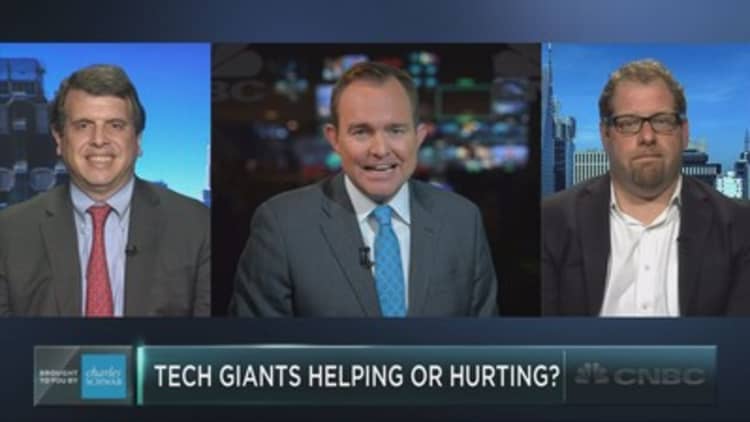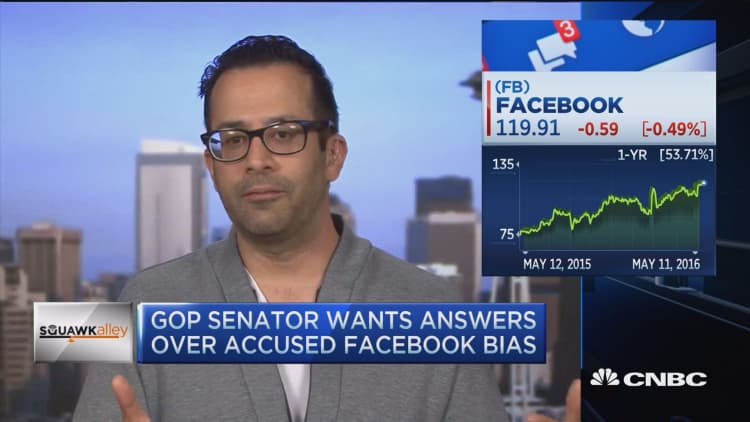Mark Zuckerberg has kicked off a probe into claims Facebook suppressed pro-conservative stories and forced others to artificially appear in the social media site's influential "trending topics" list.
In a post on Thursday evening, the Facebook CEO said that being open to all viewpoints was at the "core of everything Facebook is and everything I want it to be."
"Every tool we build is designed to give more people a voice and bring our global community together," he said.
Zuckerberg's comments came after tech blog Gizmodo kicked off a furor on Monday over whether Facebook allowed its "trending topics" module to move organically in line with users' interests, or manipulated it by using news judgment similar to that employed by traditional media outlets.
Gizmodo cited former Facebook "news curators," who claimed that fellow curators had routinely prevented stories with a conservative slant from appearing on the site's "trending topics" list.

Gizmodo cited other ex-curators who also claimed that they "forced" stories into the trending topics module, which appears on users' pages on the desktop site to let them know what topics are most popular with other users, before they were actually trending.
The claims appeared at odds with Facebook's assertion that trending topics were identified by algorithms and only then reviewed by the trending topics team to meet certain standards, such as whether the topic was tied to a current, real news event.
Zuckerberg said in his post that the company took the Gizmodo claims very seriously and was conducting a full investigation to ensure the integrity of its trending module was upheld.

"We have found no evidence that this report is true," he said. "If we find anything against our principles, you have my commitment that we will take additional steps to address it."
In addition to the investigation, Zuckerberg said he would invite "leading conservatives and people from across the political spectrum" to share their views with him.
Gizmodo said one former news curator said that conservative stories appeared to have been suppressed in line with the curators' personal political viewpoints or knowledge of the topic. Another former curator supported the allegations, the website said.
Others claimed that they were explicitly instructed by their managers at Facebook to manipulate the trending topics algorithm by inserting topics into the module before they had gathered momentum among Facebook users.
Gizmodo's sources cited the disappearance of Malaysia Airlines Flight MH370, the Charlie Hebdo terrorist attack in Paris, events in the Syrian conflict and the Black Lives Matter movement as instances where the trending topics team injected topics into the module.
A day after the Gizmodo report, Facebook's search vice president, Tom Stocky, denied that Facebook had ever artificially inserted stories into trending topics. Stocky also said that suppressing stories was "technically not feasible."
"Facebook does not allow or advise our reviewers to systematically discriminate against sources of any ideological origin and we've designed our tools to make that technically not feasible," he said. "At the same time, our reviewers' actions are logged and reviewed, and violating our guidelines is a fireable offense."
The Gizmodo report prompted Republican Sen. John Thune of South Dakota, who chairs the Senate Committee on Commerce, Science and Transportation, to write to Zuckerberg to ask for more details on the allegations. The committee has oversight on issues of internet communications, consumer protection and media issues.
The U.K. newspaper The Guardian on Thursday published what it said were internal Facebook guidelines that showed the extent to which human curators could shape the computer-generated trending topics list. Facebook then published its own overview of how trending topics worked.


